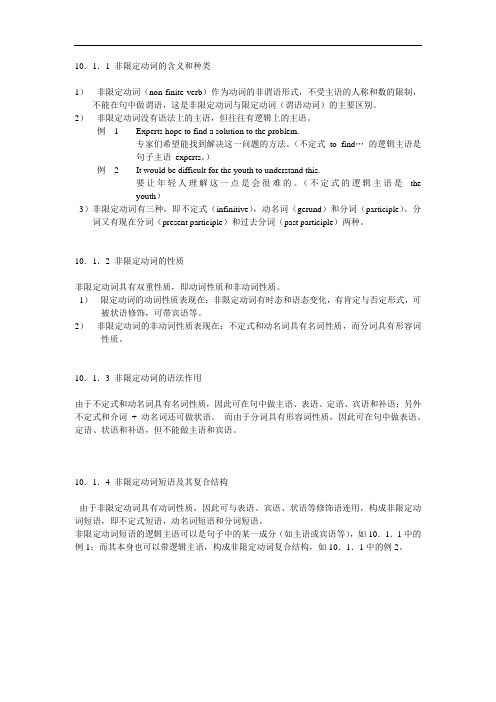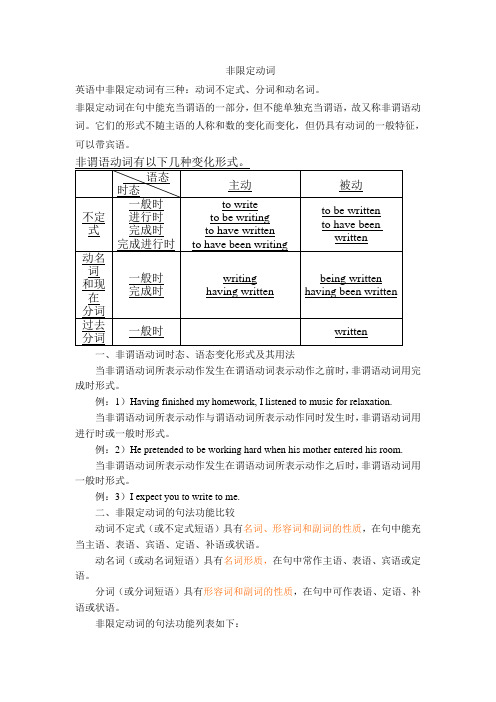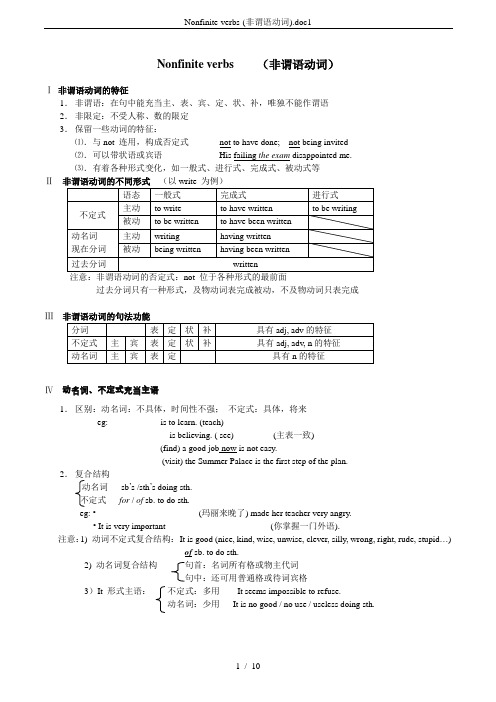英语中的非限定动词 (Nonfinite Verbs)讲解
- 格式:ppt
- 大小:97.50 KB
- 文档页数:33

非限定动词(Non-finite verb)一、定义:非限定动词在句中不可单独用作谓语,不受主语的人称和数的限制;它在句中可以用作其他句子成分。
它包括三种:不定式(infinitive)、动名词(gerund)、分词(participles)。
二、功能:三、形式:☆现在分词的形式等于动名词,过去分词的形式即为动词的过去分词。
☆过去分词通常表示逻辑主语的动作已完成,或者与逻辑主语间是被动关系,如:Gone from home so long, they couldn’t recognize the place at all. (表示动作已完成)Some of them, born and brought up in villages, had never seen a train. (表示被动)四、用法注意点:1、不定式①作宾补时,不带to的动词:感觉动词(feel,see,hear,watch,notice等)和使役动词(make,let,have),如:We felt the house shake. I would have you know that I am ill. (不带to的不定式)☆find与help之后,不定式可带to可不带to。
②“for+名(代)词+不定式”结构,如:For a child to do that job isn’t suitable. It’s time for us to go.☆在adj. + for sb. to do sth.和adj. + of sb. to sth.结构中,当形容词表示客观意义时,用for,如difficult,easy,impossible,important,hard等;当形容词表示主观意义时,用of,如nice, kind, good, bad, honest, stupid, silly, clever等。
比较下面两个句子:It’s kind of you to say so. It’s easy for you to say so.③“疑问词+不定式”结构:疑问词who, what, which, when, where, how后加不定式可构成一种特殊短语,在句中可用作主语、宾语、表语等。

10.1.1 非限定动词的含义和种类1)非限定动词(non-finite verb)作为动词的非谓语形式,不受主语的人称和数的限制,不能在句中做谓语,这是非限定动词与限定动词(谓语动词)的主要区别。
2)非限定动词没有语法上的主语,但往往有逻辑上的主语。
例 1 Experts hope to find a solution to the problem.专家们希望能找到解决这一问题的方法。
(不定式to find…的逻辑主语是句子主语experts。
)例 2 It would be difficult for the youth to understand this.要让年轻人理解这一点是会很难的。
(不定式的逻辑主语是theyouth)3)非限定动词有三种,即不定式(infinitive),动名词(gerund)和分词(participle)。
分词又有现在分词(present participle)和过去分词(past participle)两种。
10.1.2 非限定动词的性质非限定动词具有双重性质,即动词性质和非动词性质。
1)限定动词的动词性质表现在:非限定动词有时态和语态变化,有肯定与否定形式,可被状语修饰,可带宾语等。
2)非限定动词的非动词性质表现在:不定式和动名词具有名词性质,而分词具有形容词性质。
10.1.3 非限定动词的语法作用由于不定式和动名词具有名词性质,因此可在句中做主语、表语、定语、宾语和补语;另外不定式和介词+ 动名词还可做状语。
而由于分词具有形容词性质,因此可在句中做表语、定语、状语和补语,但不能做主语和宾语。
10.1.4 非限定动词短语及其复合结构由于非限定动词具有动词性质,因此可与表语、宾语、状语等修饰语连用,构成非限定动词短语,即不定式短语,动名词短语和分词短语。
非限定动词短语的逻辑主语可以是句子中的某一成分(如主语或宾语等),如10.1.1中的例1;而其本身也可以带逻辑主语,构成非限定动词复合结构,如10.1.1中的例2。


非限定动词英语中非限定动词有三种:动词不定式、分词和动名词。
非限定动词在句中能充当谓语的一部分,但不能单独充当谓语,故又称非谓语动词。
它们的形式不随主语的人称和数的变化而变化,但仍具有动词的一般特征,可以带宾语。
一、非谓语动词时态、语态变化形式及其用法当非谓语动词所表示动作发生在谓语动词表示动作之前时,非谓语动词用完成时形式。
例:1)Having finished my homework, I listened to music for relaxation.当非谓语动词所表示动作与谓语动词所表示动作同时发生时,非谓语动词用进行时或一般时形式。
例:2)He pretended to be working hard when his mother entered his room.当非谓语动词所表示动作发生在谓语动词所表示动作之后时,非谓语动词用一般时形式。
例:3)I expect you to write to me.二、非限定动词的句法功能比较动词不定式(或不定式短语)具有名词、形容词和副词的性质,在句中能充当主语、表语、宾语、定语、补语或状语。
动名词(或动名词短语)具有名词形质,在句中常作主语、表语、宾语或定语。
分词(或分词短语)具有形容词和副词的性质,在句中可作表语、定语、补语或状语。
非限定动词的句法功能列表如下:1.动词不定式(短语)、和动名词(短语)作主语的区别1)当主语和表语都是非限定动词形式时,主语和表语的非限定形式要求一致。
例:①To live is to struggle. [正]②To live is struggling. . [误]③Living is to struggle. . [误]④Living is struggling. . [正]2)当主语为非限定动词,而表语不是的时候,不定式和动名词作主语都可以,意义有区别,但区别很小,可忽略。
区别在于:不定式强调动作性,常表示一次性、短暂的动作;而动名词倾向于名词性,常指多次重复的动作。

Nonfinite verbs (非谓语动词)Ⅰ非谓语动词的特征1.非谓语:在句中能充当主、表、宾、定、状、补,唯独不能作谓语2.非限定:不受人称、数的限定3.保留一些动词的特征:⑴.与not 连用,构成否定式not to have done; not being invited⑵.可以带状语或宾语His failing the exam disappointed me.⑶.有着各种形式变化,如一般式、进行式、完成式、被动式等Ⅱ注意:非谓语动词的否定式:not 位于各种形式的最前面过去分词只有一种形式,及物动词表完成被动,不及物动词只表完成Ⅲ非谓语动词的句法功能Ⅳ动名词、不定式充当主语1.区别:动名词:不具体,时间性不强;不定式:具体,将来eg: ___________ is to learn. (teach)___________ is believing. ( see) (主表一致)___________ (find) a good job now is not easy.___________ (visit) the Summer Palace is the first step of the plan.2.复合结构动名词sb’s /sth’s doing sth.不定式for / of sb. to do sth.eg: • _______________________(玛丽来晚了) made her teacher very angry.• It is very important _______________________ (你掌握一门外语).注意:1) 动词不定式复合结构:It is good (nice, kind, wise, unwise, clever, silly, wrong, right, rude, stupid…)of sb. to do sth.2) 动名词复合结构3)It 形式主语:不定式:多用It seems impossible to refuse.动名词:少用It is no good / no use / useless doing sth.Ⅴ非谓语动词作表语1.区别:A. 动名词不具体,时间性不强不定式具体,将来• Their job is ___________ houses. (build)• Their work is ___________ the house. (build)B. 动名词:表对等关系,主语常为抽象名词,可互换位置现在分词:说明主语性质、特征,是限定关系,不可互换位置• My job is teaching ---- Teaching is my job.• The book is interesting. The scene is frightening.C. 现在分词:表性质、特征(常只有一般主动式)过去分词:表状态、特征(和主语构成动宾关系)• His speech is ______________• I'm much _______________ (inspire)• The meeting is _________(bore),so I feel very ______(tire)2. 常见表感情的分词1) amusing; astonishing; disappointing; exciting; frightening; interesting; moving; relaxing; satisfying;shocking; surprising; tiring; worrying; pleasing… (令人…)2)上述现在分词相应的过去分词(感到…)3.非谓语动词还可作其他系动词的表语:eg: He seemed to have worked it out. He got injured in the accident.Things remained unchanged. The story sounds amazing.EXERCISES1._____ is a good form of exercise for both young and old.A. The walkB. WalkingC. To walkD. Walk2._____ for the people is a glorious death.A. To dieB. DeadC. To be diedD. Being died3.To answer correctly is more important than _____.A. a quick finishB. to finish quicklyC. finishing quicklyD. finished quickly4.It is careless _____ the same mistake time and again.A. for you to makeB. of you to makeC. of you makingD. your making5.The door remains _____.A. lockingB. lockedC. closingD. to lock6. ---You look pale. ---I feel a little _____.A. tiringB. tiredC. tireD. tiresome7.You are our monitor. This is _____.A. for you to decideB. of you to decideC. your decidingD. you to decide8.He seems _____ here for 3 years.A. to be livingB. to have livedC. to liveD. having lived9.Her wish is _____ an engineer.A. becomingB. to becomeC. to be becomingD. become10.What I don’t like is _____.A. others’ shoutingB. they shoutingC. for them to shoutD. they shout11._____ pity on is taken for granted.A. The weak’s takenB. the weak being takenC. His being takenD. Tom’s taking12.Cleaning women in big cities usually get _____ by the hour.A. payB. payingC. paidD. to pay13.The difficulty is _____ in touch with them.A. to getB. how to getC. how gettingD. our getting14.---What’s made you so upset?--- _____ 3 tickets to the pop music concert.A. LostB. LosingC. Because of losingD. Since I lost15.As his business grows bigger, _____ will be part of his life.A. flight constantlyB. constant flyingC. flying constantlyD. to be flyingⅥ动名词和不定式作宾语1eg: • If you keep practicing speaking English, you can learn it well.• He devotes all his spare time to colleting stamps.2I'm learning to drive. √He knows how to drive √I'm learning how to drive. √ He knows to drive ╳eg: • she enjoys _____ (listen) to light music.• Would you mind _____ (go) on foot this evening?• Things keep _____ (change).• We are planning _____ (visit) Euro pe this summer.• Do you know _____ (operate) the machine?• He pretended _____ when I came in.A. readingB. to be readingC. to readD. being read3.跟动名词和不定式意义不同的词:⑴like, love, hate 区别不太大I hate lying. (不具体,时间性不强)I love to skate today. (具体)⑵remember, forge tHe must have forgot _____ (turn) off the light. It is still on. (去做某事)I remembered _____ (read) it in some magazine. (做过某事)⑶regret后悔作了某事,+动名词遗憾或抱歉要做某事,+不定式(tell, say, report, announce…)后悔没做某事,+动名词或不定式完成式的否定式I regret _____________________ (not study) hard when at college.I regret _________(say) that you are dismissed.⑷try to do sth努力做…try doing…尝试做…Let’s try ________(do ) it in another wayWe should try ________(get) everything ready in time.⑸begin, start一般情况下,两者皆可。

非谓语动词1、定义:在句子中充当除谓语以外的各种句子成分的动词形式,叫做非谓语动词(the Non-Finite Verbs)。
非谓语动词也是动词的一种,他们有着动词的其他特点,可以充当主语、宾语、状语等。
非谓语动词与谓语动词是相对的概念。
形式功能:动词不定式动词不定式:(to)+ do,具有名词、形容词、副词的特征。
否定式:not + (to) do以do为例,动词不定式的构成如下:1.一般式:不定式的一般式所表示的动作与谓语动词动作同时发生或发生在谓语动词动作之后.例如:It's nice to meet you.很高兴见到你。
He seems to know a lot. 他看起来懂得很多。
We plan to pay a visit. 我们计划去参观。
He wants to be an artist. 他想成为一个艺术家。
The patient asked to be operated on at once. 病人要求马上手术。
The teacher ordered the work to be done. 老师要求完成工作。
2.进行式:不定式的进行式所表示的动作与谓语动词动作同时发生,例如:The boy pretended to be working hard. 男孩假装工作得很努力。
He seems to be reading in his room. 看起来他正在他的房间里面读书。
3.完成式:不定式的完成式表示的动作发生在谓语动词动作之前,例如:I regretted having told a lie. 我后悔我说谎了。
I happened to have seen the film. 我偶然看过这部电影。
He is pleased to have met his friend. 他很高兴能遇上他的朋友。
不定式的句法功能:(1)作主语:To finish the work in ten minutes is very hard. 十分钟之内完成这项工作是很难的。